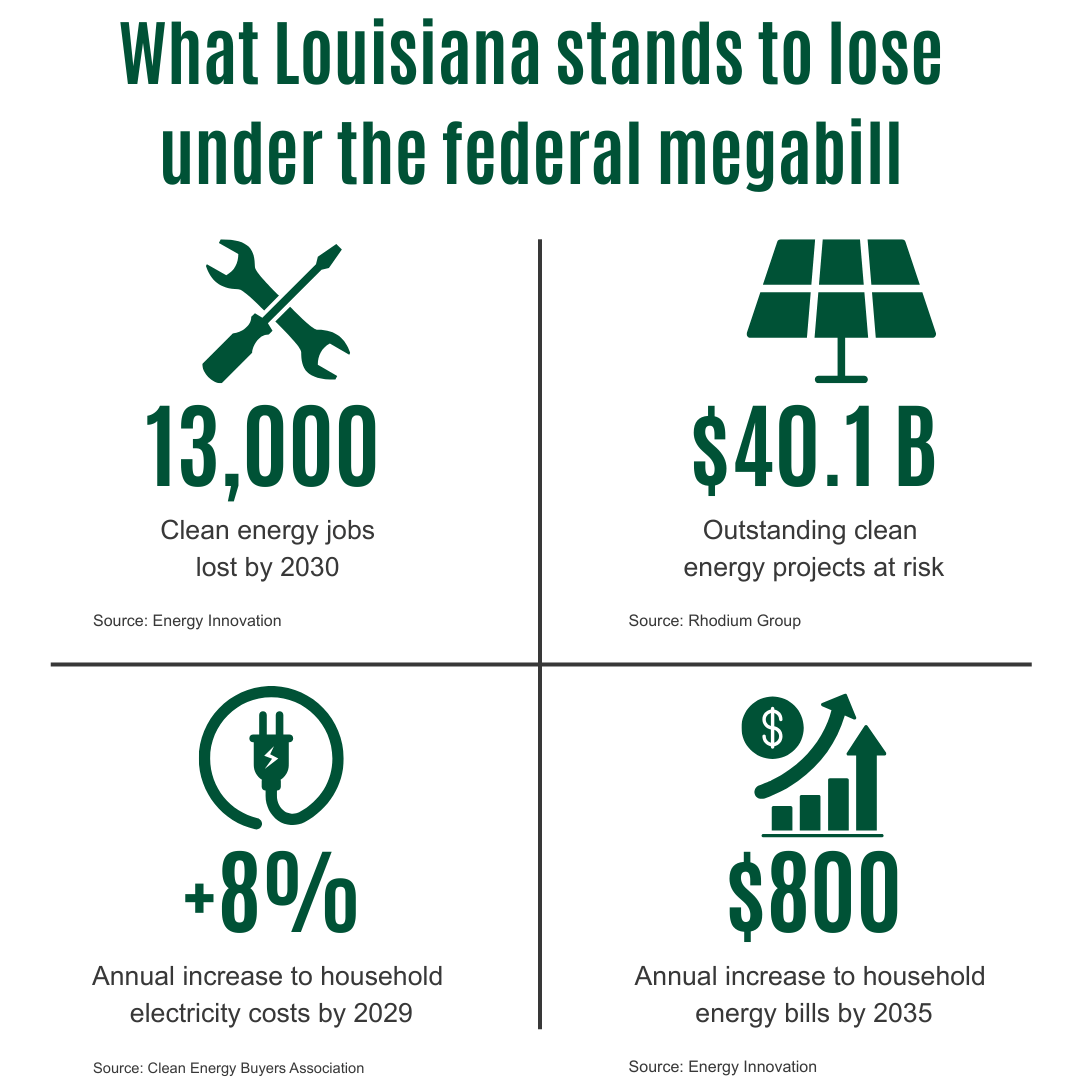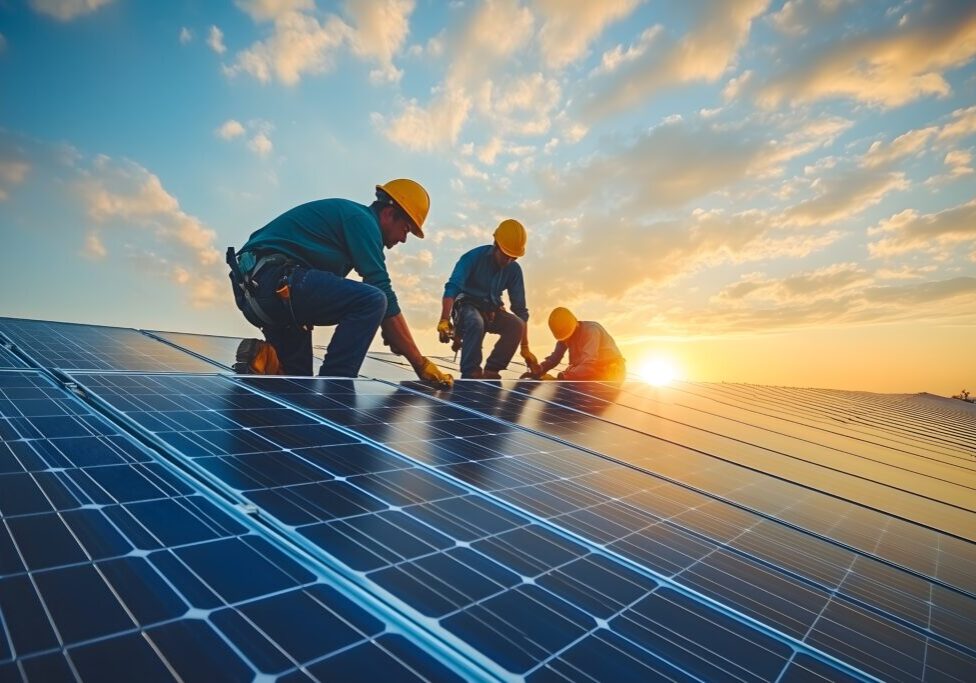Louisiana’s communities and businesses need access to clean, affordable energy in order to thrive and reach their full potential. The federal budget and tax megabill, signed into law by President Trump, moves the state farther from that goal by repealing many of the climate and clean energy investments made under the Inflation Reduction Act (IRA). The new law undermines billions of dollars in new projects and threatens thousands of jobs already in development across the state. The repeal of tax credits for clean energy, manufacturing, home electrification and electric vehicles risks stalling Louisiana’s economic momentum, increasing energy bills for families, and making the state more vulnerable to the effects of a changing climate.
Gutting clean energy incentives
The new federal law (H.R. 1) repeals or dramatically limits the availability of the core tax credits that were driving Louisiana’s clean energy boom. These new reductions include the Clean Electricity Production and Investment Tax Credits, and tax credits that help make electric vehicles and home energy upgrades more affordable. Without these supports, many clean energy projects in the pipeline now face cancellation or delays.
Louisiana currently has over 4 gigawatts of clean energy capacity online and another 1.13 gigawatts in development, supported by more than 7,400 jobs. These investments not only reduce emissions, but also bring critical economic activity to communities across the state. This is enough to power roughly 3.3 million homes based on average U.S. household electricity use, according to the EIA.
Major projects potentially at risk include the 240 megawatt Dolet Hills Solar Project in DeSoto Parish—built on a former coal site—representing a $250 million investment that will produce enough energy to power approximately 45,000 homes. The 150-MW Mowata Solar Project in Acadia Parish, led by Lightsource bp, would provide over 250 construction jobs and generate power for 30,000 homes. Another 150-MW solar installation in Pointe Coupee Parish by NextEra Energy Resources is expected to yield $43 million in local tax revenue over 35 years. All of these projects are possibly jeopardized under the new law.
H.R. 1 is not the only mechanism undermining Louisiana’s clean energy future. Federal administrative actions are also compounding the damage. On August 15, the IRS eliminated the long-standing “5 percent safe harbor” rule, which allowed large-scale wind and solar projects to qualify for federal tax credits by incurring only a fraction of upfront costs. This change creates new hurdles for developers trying to meet tight construction deadlines before federal subsidies vanish.
While rooftop solar installations remain exempt, the rule change could directly affect major Louisiana projects—that may now struggle to secure remaining credits before expiration. Solar Energy Industries Association CEO Abigail Ross Hopper warned that the new guidance is “yet another act of energy subtraction…that will further delay the build-out of affordable, reliable power,” leaving “American families and businesses [to] pay more for electricity…as China continues to outpace us in the race for electricity to power A.I.” Together, these legislative and administrative setbacks place Louisiana’s clean energy transition at even greater risk.

Higher costs for families and delayed environmental justice
The new law repeals home electrification and energy efficiency rebates, which means higher electricity bills for Louisiana households. This will disproportionately affect low-income and minority households, which already face a high energy burden. Louisiana families could see their energy bills increase by as much as $260 more per year by 2030, and $800 more by 2035, as a result of the repeal of residential tax credits. Renters and low-income households will be hit the hardest, as they lose access to financial support for efficient appliances, insulation and rooftop solar.
Louisiana is on the front lines of climate change and pollution, yet the new federal law reverses investments meant to enhance resilience and address environmental injustice. The law rescinds funding for the Greenhouse Gas Reduction Fund and blocks implementation of Environmental and Climate Justice Block Grants. State officials considered these programs to be an important step forward for Louisiana, and in 2024, the Louisiana Department of Energy and Natural Resources issued a press release with the Secretary indicating “ [through the Solar for All] program, Louisiana can create a sustainable foundation for long-term impact and benefit for those most threatened and most in need.”
Louisiana’s $156 million award under the federal “Solar for All” program, which aimed to expand solar access in underserved areas, is now at risk. Without these targeted investments, communities most vulnerable to climate shocks will be left behind yet again.
Undermining emerging industries and grid stability
H. R. 1 casts serious doubt on the future of emerging industries like clean hydrogen and advanced manufacturing, both of which are poised to grow along Louisiana’s Gulf Coast. By weakening or repealing the 45V hydrogen production credit, the law stalls major hydrogen hub investments that could have helped decarbonize heavy industry and transport.
Clean manufacturing investments potentially in jeopardy include First Solar’s $1.1 billion facility in Iberia Parish, which would create 700 direct jobs with an average salary of $80,000. Also at risk is Koura’s $800 million battery materials plant in St. Gabriel and the $500 million UBE Corporation facility in Jefferson Parish. Combined, these facilities were expected to deliver thousands of construction and permanent jobs and position Louisiana as a leader in battery manufacturing. Syrah Resources’ graphite plant in Vidalia, supported by over $320 million in federal support, represents the first large-scale facility of its kind outside China. Its future is now uncertain.
Simultaneously, the state’s electricity demand is expected to rise significantly, driven in part by the buildout of AI and data infrastructure, including Meta’s $10 billion facility in Richland Parish. That facility alone could consume nearly 30 percent of the state’s electric capacity without renewable investment to meet that demand.
Higher bills, fewer jobs and a dirtier future
H. R. 1 is not just a rollback—it is a direct assault on Louisiana’s future. By stripping away clean energy investments at a time of unprecedented opportunity, the law threatens to raise energy costs, eliminate thousands of jobs, and deepen environmental harm in communities already facing the brunt of pollution and climate change. Rather than building on momentum from the Inflation Reduction Act, H. R. 1 puts Louisiana’s energy transition in reverse. At a time when the state should be leading, it is being forced to fall behind.
